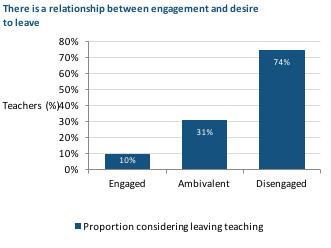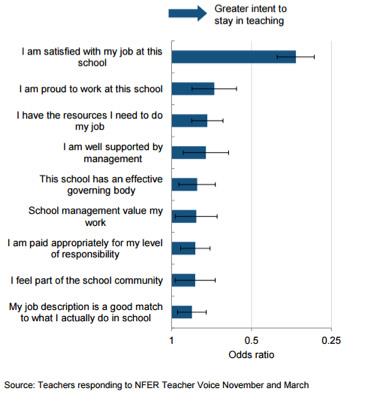Recruiting and retaining enough teachers to serve growing numbers of pupils is one of the key challenges facing education in England. Many of the policy interventions have focused on teacher recruitment, but far less attention has been paid to retaining teachers currently employed in state schools.
Headteachers and senior leaders have an important role to ensure that when a school employs a good teacher they do their best to retain them. NFER’s new research – Engaging Teachers: NFER Analysis of Teacher Retention – found that teachers who are well supported and valued by school management are more likely to stay in the profession.
NFER surveyed a nationally representative sample of more than 2,300 teachers over the course of a year and interviewed a small sample of teachers who had either left teaching or were considering leaving.
The research found that while the majority of teachers are not considering leaving the profession, the proportion considering leaving has increased significantly in the last year, from 17 to 23 per cent.
Smaller proportions than this actually leave the profession (10 per cent in 2015 including retirees), but this figure too has increased in recent years, suggesting that retention pressures are growing. The research investigated how engaged and supported teachers feel and analysed how this relates to their intention to remain in or leave the profession.
Keeping teachers engaged is key
Teachers were asked about the extent to which they agreed with 16 statements about school leadership, reward and recognition, resources, school culture and ethos, and their own professional development. Their responses were used to derive a measure of overall teacher engagement.
The research found a relationship between teacher engagement and retention. Around half of teachers were engaged in their role, and the more engaged they were, the less likely they were to consider leaving teaching. While most (90 per cent) of the engaged teachers were not considering leaving, 10 per cent of them were. Losing engaged teachers could be a serious problem for the education sector.
Protecting teachers from the pressures
We interviewed a small sample of 21 teachers who had left the profession or were considering the move. They gave interesting insights into why some teachers may be leaving the profession and workload was at the centre of these.
This was thought to partly stem from trying to keep up with the pace of policy change. One teacher said: “It’s ridiculously hard to keep on top of (policy change). I’m not really sure what I’m supposed to be doing and not really sure if I’m doing it right.”
Workload was also perceived to result from the pressure to meet the measures in the inspection framework and the effort it took to gather evidence that they were meeting requirements.
School leaders and school governors were identified as having an important role in protecting staff from these pressures, yet this was not always taking place.
Not all teachers had asked for support though, recognising that leaders are under pressure too, or because they were concerned it would show weakness. As one teacher commented: “The pressures for people in leadership are so great it puts a lot more pressure on people lower down.”
Teachers wanted more non-teaching time to plan, to reflect on their own practices, and to learn from others.
Managing workload had, in their view, prevented them from having spare time for effective planning and reflection.
Many of our 21 teachers reported that they did not feel sufficiently valued for all of their efforts, by government or leaders in their schools. For some, a tipping point was reached, such as stress-related illness. The pressure had taken its toll and they decided to leave the profession.


Should I stay or should I go? The relationship between teacher disengagement and their desire to leave the profession (top graph) and the ‘protective factors’ that lead to teachers remaining in the profession (above) as discovered in NFER’s research
Protective factors
Further analysis of teachers’ responses to the engagement statements revealed a range of “protective factors” which were associated with intent to stay, and are therefore likely to be critical for improving retention.
Unsurprisingly, by far the strongest predictor was job satisfaction, but other significant predictors included being well supported and valued by management. Having an effective governing body in the teachers’ school also increased the likelihood of them staying in the profession. These findings strongly suggest that the right support for teachers could help to retain them.
While receiving appropriate pay for their level of responsibility was a protective factor for teachers, a number of those interviewed felt that pay was not the main motivating factor. Rather, they felt other forms of reward and recognition would also make them feel more valued.
How to support teacher retention
Monitor teacher intentions and engagement: The more engaged teachers are, the less likely they are to consider leaving. School leaders should monitor levels of engagement among their staff, either informally or through more formal methods such as teacher surveys. They may be able to improve retention rates by investigating the causes of any ambivalence or low engagement.
Engage (or re-engage) the workforce
School leaders should reflect on the protective factors found to be associated with teacher retention, which could help to engage staff. These include the support they themselves give as managers, but also job satisfaction, having adequate resources, and being paid (or rewarded) appropriately.
Support staff wellbeing
A greater focus should be placed on staff wellbeing. This could include schools having a governor or trustee responsible for staff welfare, or a member of the management team with specific time and responsibilities in this area. Mentoring and/or mental health provision could be beneficial for some staff. School leaders have a key role to play in protecting staff from what was described as a “tsunami of change”. This should include being able to distil policy without it becoming burdensome for staff. School leaders should also help staff to juggle their responsibilities, including by looking more closely at how flexible working opportunities could be implemented more widely and effectively, to ensure that they benefit both teachers and the school.
Value and trust teachers
Too much negativity about the profession and too little support can lead to teachers feeling undervalued. Methods of engaging teachers need to take place within a positive narrative, to ensure they feel valued and trusted.
- Sarah Lynch is a senior research manager at the National Foundation for Educational Research (NFER) and is part of a team of researchers who have been investigating the challenge of teacher retention.
Further information
The full report, Engaging Teachers: NFER Analysis of Teacher Retention, is available for free via
www.nfer.ac.uk/publications/LFSB01/
